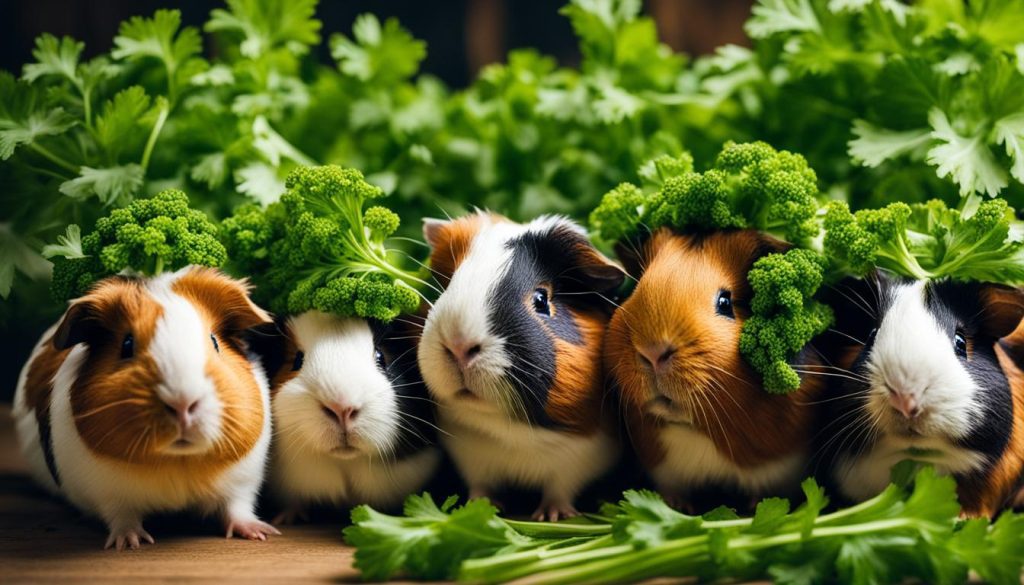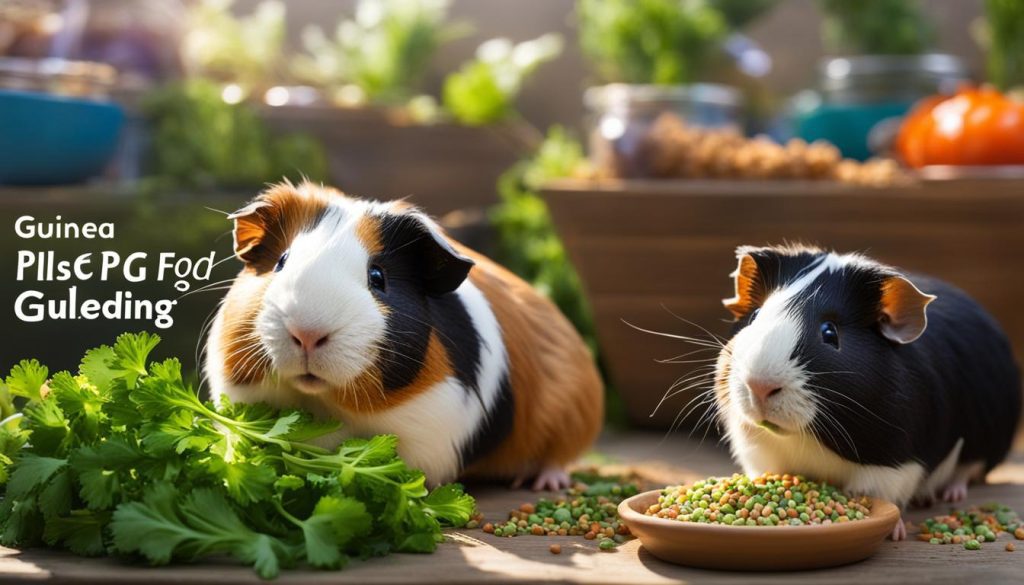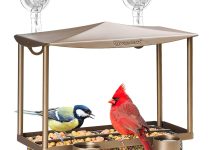Hi there, fellow guinea pig enthusiasts! Today, I want to discuss a popular question among guinea pig owners: Can guinea pigs eat parsley? As responsible pet parents, we always strive to provide our furry friends with a balanced diet that promotes their health and well-being. So, let’s dive into the world of guinea pig nutrition and explore whether parsley is a safe and suitable snack for our adorable little companions.
Guinea pigs require a varied diet that includes pellets, hay, and fresh vegetables. They rely on us to provide them with vitamin C-rich foods since they can’t produce this essential nutrient on their own. That’s why introducing parsley, which is packed with vitamin C, into their diet seems like a great idea.
Grass hay should make up around 80% of their diet, providing the necessary fiber for optimal gut health. Timothy-based pellets fortified with vitamin C are also recommended to support their overall nutrition. As for fresh vegetables, leafy greens like romaine lettuce, kale, and parsley can be excellent choices. However, it’s crucial to keep portion sizes small to prevent excessive sugar intake.
Can Guinea Pigs Eat Parsley? Yes, within reasonable limits.
- Parsley is a nutritious herb rich in vitamin C, which is essential for guinea pigs’ health.
- Feeding guinea pigs a balanced diet of pellets, hay, and fresh vegetables is crucial for their overall well-being.
- Introduce new foods gradually and monitor your guinea pig’s reactions to ensure they tolerate them well.
- Consult with a veterinarian or knowledgeable breeder for personalized dietary advice tailored to your guinea pig’s needs.
- Variety is key! Make sure to provide a diverse range of fresh foods to ensure a well-rounded and nutritious diet for your beloved guinea pig.
The Nutritional Benefits of Parsley for Guinea Pigs
Parsley is a nutritious herb that can be safely consumed by guinea pigs. It is particularly rich in vitamin C, with a content higher than that of many fruits and vegetables. Vitamin C is crucial for guinea pigs’ health, as it helps prevent scurvy and supports their immune system. Parsley also contains calcium, which is important for bone health in guinea pigs. However, it is essential to feed parsley in moderation and as part of a varied diet to ensure your guinea pig receives a range of nutrients. Avoid feeding large amounts of any single food, including parsley, and provide a good variety of fresh foods each day.

When it comes to guinea pig nutrition, promoting guinea pig health should be a top priority. Including parsley in their diet is a great way to achieve this goal. The high vitamin C content in parsley helps to prevent scurvy, a common health issue in guinea pigs. It also boosts their immune system, keeping them happy and active. In addition, the calcium in parsley contributes to strong bones in guinea pigs, ensuring their overall well-being.
However, it’s important to note that while parsley has its benefits, it should not be the sole focus of your guinea pig’s diet. A balanced and varied diet is key to providing them with the necessary nutrients for optimal health. Along with parsley, include other fresh vegetables, hay, and pellets in their daily meals. Offering a diverse range of foods ensures that your guinea pig receives a well-rounded and nutritious diet.
Remember, moderation is key. While parsley is beneficial, it should be given as part of a balanced diet, rather than in excessive amounts. Feeding large quantities of any single food can disrupt the nutritional balance and potentially lead to health issues in guinea pigs. So, incorporate parsley into their meals as a flavorful and vitamin-packed addition, but remember to include other essential foods as well.
Guidelines for Feeding Parsley to Guinea Pigs
Feeding parsley to guinea pigs can be a healthy and enjoyable addition to their diet. To ensure their safety and well-being, it’s important to follow some guidelines:
1. Start with small amounts: When introducing parsley to your guinea pig’s diet, begin by offering small amounts as a treat or addition to their regular food. This allows them to adjust to the new food gradually.
2. Include both stalks and leaves: To minimize waste and provide a variety of textures, offer both the stalks and leaves of parsley. Guinea pigs may enjoy chewing on the stalks, and the leaves contain valuable nutrients.
3. Consider growing parsley at home: Growing parsley at home can be a cost-effective option and ensures a fresh and readily available source of food for your guinea pigs. Just make sure to use safe and pesticide-free soil and water.
4. Include a variety of fresh foods: While parsley can be a healthy addition to their diet, it’s important to provide a well-rounded nutritional intake. Include a variety of other fresh foods such as leafy greens, vegetables, and fruits to ensure their dietary needs are met.
Remember, each guinea pig is unique, and their dietary needs may vary. It’s always a good idea to consult with a veterinarian or knowledgeable breeder for specific dietary recommendations based on your guinea pig’s individual needs.

Feeding Guidelines for Parsley:
| Parsley | Feeding Frequency | Portion Size |
|---|---|---|
| Parsley Stalks and Leaves | 2-3 times per week | A few sprigs or leaves |
Other Herbs and Foods for Guinea Pigs
When it comes to the guinea pig diet, it is important to be cautious with other herbs and foods. While parsley is safe and beneficial for your furry friends, there are a few items that should be avoided or approached with care.
- Chives: Chives can cause blood abnormalities in guinea pigs and should be avoided in their diet.
- Bay Leaves: Although not confirmed as toxic, bay leaves have a strong taste that guinea pigs may not prefer, so it is best to avoid feeding them bay leaves.
- Basil: On the other hand, basil can be a nutritious addition to their diet in small amounts.
When considering other herbs and foods for your guinea pigs, it’s important to do thorough research and consult experts to ensure their safety and suitability for your pets’ diet. Prioritizing their well-being and care is the key to keeping your guinea pigs healthy and happy.
Conclusion
Providing a well-rounded diet and proper care is essential for ensuring the guinea pig’s health, nutrition, and overall well-being. While parsley can be a safe and healthy snack when fed in moderation, it should be part of a varied diet that includes a balance of pellets, hay, and other fresh vegetables. Guinea pigs cannot produce their own vitamin C, so it is important to incorporate foods rich in this essential nutrient to prevent health issues such as scurvy.
When introducing new foods, including parsley, it is crucial to do so gradually and observe the guinea pig’s reactions. Monitoring their stool for any signs of digestive issues is also important. Consulting with a veterinarian or knowledgeable breeder can provide personalized dietary advice based on the specific needs of the guinea pig.
Remember that guinea pigs thrive when provided with a diverse range of fresh foods and a constant supply of grass hay. Additionally, maintaining a clean and comfortable living environment, regular exercise, and providing mental stimulation are all crucial aspects of guinea pig care. By following these guidelines, you can ensure the health and well-being of your furry friend and enjoy many happy years together.
FAQ
Can guinea pigs eat parsley?
Yes, guinea pigs can safely eat parsley. It is a nutritious herb that provides them with essential vitamins, including vitamin C.
Why is parsley beneficial for guinea pigs?
Parsley is beneficial for guinea pigs because it is rich in vitamin C, which is crucial for their health and helps prevent scurvy. It also contains calcium, which is important for their bone health.
How much parsley should I feed to my guinea pig?
Parsley should be fed in moderation. Start by offering small amounts as a treat or addition to their regular diet. It is recommended to include both the stalks and leaves of parsley to minimize waste.
Can I grow parsley at home for my guinea pigs?
Yes, growing parsley at home can be a cost-effective option. It allows you to provide a fresh and readily available source of food for your guinea pigs.
Are there any other herbs or foods that guinea pigs should avoid?
Chives should be avoided as they can cause blood abnormalities in guinea pigs. While bay leaves are not confirmed as toxic, most guinea pigs may not prefer their strong taste. Basil, however, can be a nutritious addition to their diet in small amounts.
What should a balanced diet for guinea pigs include?
A balanced diet for guinea pigs should include pellets, hay, and fresh vegetables. Grass hay should make up around 80% of their diet, while timothy-based pellets fortified with vitamin C are recommended. Fresh vegetables, including parsley, can be offered daily.






